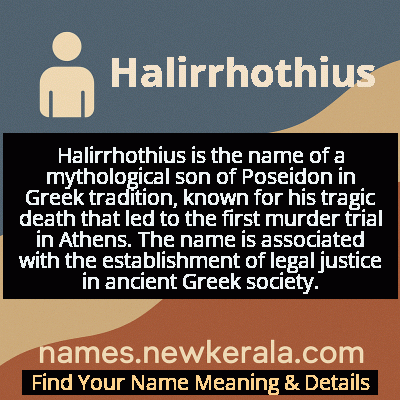Halirrhothius Name Meaning & Details
Origin, Popularity, Numerology Analysis & Name Meaning of Halirrhothius
Discover the origin, meaning, and cultural significance of the name HALIRRHOTHIUS. Delve into its historical roots and explore the lasting impact it has had on communities and traditions.
Name
Halirrhothius
Gender
Male
Origin
Greek
Lucky Number
4
Meaning of the Name - Halirrhothius
Halirrhothius is the name of a mythological son of Poseidon in Greek tradition, known for his tragic death that led to the first murder trial in Athens. The name is associated with the establishment of legal justice in ancient Greek society.
Halirrhothius - Complete Numerology Analysis
Your Numerology Number
Based on Pythagorean Numerology System
Ruling Planet
Uranus (Rahu)
Positive Nature
Strong sense of order, loyal, practical, and disciplined.
Negative Traits
Stubborn, overly serious, rigid, and prone to feeling restricted.
Lucky Colours
Blue, gray.
Lucky Days
Saturday.
Lucky Stones
Blue sapphire.
Harmony Numbers
1, 7, 8.
Best Suited Professions
Managers, engineers, accountants, organizers.
What People Like About You
Dependability, discipline, practicality.
Famous People Named Halirrhothius
Halirrhothius of Greek Myth
Mythological Figure
Son of Poseidon whose murder by Ares led to the first trial at the Areopagus
Halirrhothius (Literary Character)
Mythological Character
Central figure in the myth explaining the origin of Athens' legal system
Halirrhothius (Art Subject)
Mythological Subject
Featured in various ancient artworks depicting the conflict between Ares and Poseidon
Name Variations & International Equivalents
Click on blue names to explore their detailed meanings. Gray names with will be available soon.
Cultural & Historical Significance
The story also illustrates the complex dynamics of divine relationships and their impact on mortal affairs. As Poseidon's son, Halirrhothius's death created tension between major Olympian deities, with Poseidon demanding retribution while Zeus oversaw the legal process. This narrative demonstrates how Greek mythology often served to explain and legitimize social institutions, using divine conflicts to mirror and justify human legal developments. The Halirrhothius myth thus functions as both religious explanation and social commentary on the origins of Athenian jurisprudence.
Extended Personality Analysis
Based on mythological context, Halirrhothius likely possessed traits characteristic of divine offspring in Greek tradition—confidence bordering on arrogance, a sense of entitlement from his Poseidon lineage, and the boldness to confront powerful figures like Ares. His fatal encounter suggests either great courage or foolish recklessness, possibly driven by the tempestuous nature inherited from his sea-god father. The mythological tradition implies he embodied the dangerous combination of divine power and mortal limitation that often proved fatal to Greek mythological figures.
His story positions him as a symbolic representation of youthful hubris and the perils of challenging established hierarchies. While specific personality details are sparse in ancient sources, the circumstances of his death paint a picture of someone who either underestimated the consequences of his actions or believed his divine parentage offered sufficient protection. This tragic archetype serves as a warning about the limits of divine favor and the importance of respecting boundaries and authorities in Greek cultural values.
Modern Usage & Popularity
In contemporary times, the name Halirrhothius remains exceptionally rare and is primarily confined to academic discussions, classical studies, and mythological references. It has never gained traction as a popular given name due to its challenging pronunciation, obscure mythological background, and association with a tragic narrative. The name occasionally appears in specialized contexts such as historical fiction, mythological gaming, or among classical scholars, but its usage is minimal. The complexity of the name and its connection to a relatively minor mythological figure who dies violently further limit its appeal for modern naming purposes, keeping it firmly in the realm of scholarly and niche cultural applications rather than mainstream usage.
Symbolic & Spiritual Meanings
Symbolically, Halirrhothius represents the dangerous intersection of divine heritage and mortal existence, embodying the Greek concept of hubris and its consequences. His story serves as a metaphor for the limitations of privilege and the universal application of justice, regardless of one's lineage or connections. The name carries connotations of legal precedent, the transition from personal vengeance to societal justice, and the price paid for challenging powerful forces. In broader terms, he symbolizes the necessary sacrifices that sometimes accompany social progress and the establishment of civilized institutions over brute force and personal retribution.

